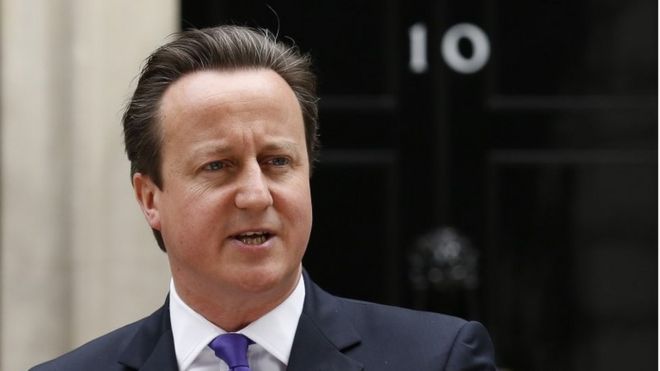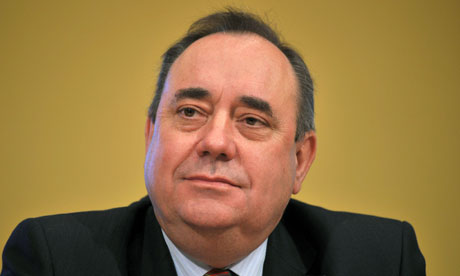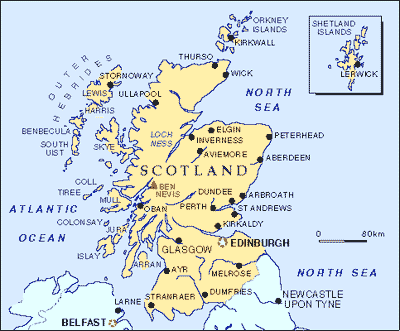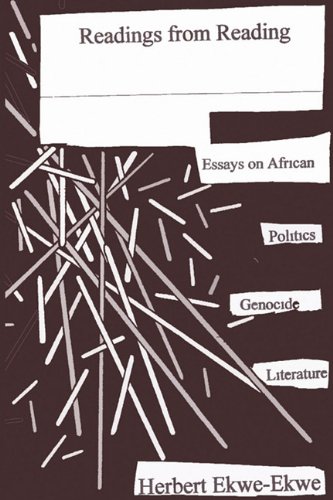THERE IS presently a hearty debate in Britain on the timetable for a referendum in Scotland on Scottish independence or, more correctly stated, the restoration of Scottish independence. Prime Minister David Cameron prefers an early vote, presumably in the next 18 months, with two “straightforward” questions on whether the Scots want independence or wish to continue to be part of Britain as it has been in the past 300 years. Cameron also wishes that the outcome of the referendum is “legally binding”, quite an unprecedented position to take as referendums in Britain, in the past, have had “advisory” or “consultative” status. Finally, he wants the minimum age of 18 for participants.
In contrast, Alex Salmond, the leader of the pro-independence Scottish Nationalist Party and Scotland’s first minister, insists that, thanks to SNP’s majority victory in last May’s elections to the Edinburgh Holyrood assembly, his party has the “mandate for the Scottish parliament to organise the referendum [on its own]… It must be a referendum built in Scotland and decided by Scottish people…” Salmond adds that he will schedule the poll in the autumn of 2014 and besides the “yes”/“no” choices favoured by Cameron, he wouldn’t rule out a third, more nuanced proto-independence choice for voters (the so-called dev-max or “devolution-maximum”) which calls for enhanced financial powers for Scotland, derived from existing devolved provisions – i.e., just short of total sovereignty as these new powers won’t affect defence and foreign affairs! For poll participation, Salmond prefers an age limit of 16 rather than Cameron’s 18.(David Cameron)
QUITE CLEARLY, the differences between both leaders on this important subject are merely procedural and not on the substantive issue of the rights of Scots, as a people, to decide their future. Despite the oft-quoted, if irreverent lines from Robert Burns, the Scottish national poet, alluding to the deteriorating Scottish economic situation at the time (caused by the so-called Darién scheme) which contributed to its parliamentarians voting for union with England, formally inaugurated in 1707 (“We are bought and sold for English gold. Such a parcel of rogues in a nation”), Scotland has not been “worse off” in the United Kingdom enterprise.(Alex Salmond)
On the contrary, Scots and their country were enriched exponentially by this union. Some scholars have dubbed the vast lands of the world that Britain conquered during its 350 years march across the globe the “Scottish empire”, rather than “British empire”, to underscore this Scottish unprecedented triumph (See, for instance, John M MacKenzie and T M Devine eds., Scotland and the British Empire, Oxford: Oxford University, 2011). And they are not so far off the mark in that characterisation! Scottish financiers and merchants, enslavers, enslaved-plantation owners, tobacco, sugar and cotton growers and the like (in the Americas), along with their English counterparts, were already immersed in reaping the gargantuan fortune wreaked from the hegemonic control of African enslavement they now shared with England. This was occasioned by the two states’ previous century’s dramatic displacement of the central role played hitherto in this holocaust by Portugal and Spain. Huge profits from African enslavement were ploughed back into Scottish sociocultural and financial institutions and cities to power the gestating industrial revolution (especially in the Glasgow conurbation) and the Scottish age of enlightenment, that very much revered heritage in the country’s national narrative. Such was the staggering outcome of this Scottish (and English) transformation that Christopher Hill, the distinguished specialist on this epoch of British history, has observed that, prior to the mid-17th century, these states were still “cultural and scientific backwater” but soon, into the following century, they had become “centre of world science” (Christopher Hill, “Lies about crimes”, The Guardian, London, 29 May 1989).(Robert Burns)
Buoyed
Buoyed by these phenomenal strides in societal fortunes and outlook, the one million Scots, a sixth of the population of the new merger-state relation, pounced on the opportunities thrown up by union with England with much aplomb: Scottish military forces with their specialised fighting units, who in the past fought for English global expansionism, henceforth had a greater stake to defend and conquer ever new seas and lands in continent after continent for the union; Scottish emigration, especially to north America, soared; Scottish conquest administrators prominently policed the union’s “empire” – from the east’s Asian frontiers through Africa to the west’s outstretches of the Americas, and, lastly, its leading intellectuals (philosophers, scientists, political-economists, writers) simultaneously valorised the thrust and goals of union and conquest. Not a few of the latter would join counterparts in England and elsewhere to particularly offer the “requisite” cultural/scientific/literary rationalisation for African enslavement and map out the presumed hermeneutical canvass of the cardinal codifiers of European World racism as an ideology. When pro-independence “colonists” in north America in the later part of the 18th century revolted against the union crown, significant sectors of Scottish émigrés (including their Ulster-Scot cousins) and institutions strongly supported freedom for the United States – a position that would obviously have appeared paradoxical for obvious reasons. One-third of delegates who signed the US independence document were of Scottish descent and 75 per cent of all US presidents since the founding of the republic are of Scottish ancestry.
State is transient; people endures(Scottish population: 5 million)
GIVEN THE TRAJECTORY of what many would feel is an illustrious history sketched above, it could appear that Scots are perhaps the most unlikely people to wish to break from Britain. Interestingly, most opinion polls conducted in Scotland show that majority of Scots do not, currently, want a restoration of their country’s independence. Ironically, a most recent of these polls shows that more English and Welsh respondents (from two of the four constituent nations in the union) than the Scots themselves want the Scots to “go”! So, a principal reason that Alex Salmond is working towards a “delayed” referendum date (last quarter of 2014) is to have more time to campaign to garner a majority vote outcome from across a Scottish population still sceptical of the restoration-of-independence for their country. Salmond wants to appeal to younger Scots (hence his intention to lower the minimum deciding voting age to 16), where disposition for independence is much greater than the older population. 2014 also presents Salmond with three “opportunity chords” to play for in the independence drive: commemorating the 700th anniversary of the battle of Bannockburn in which the Scots defeated England, Scottish hosting of the Commonwealth games, and Scottish hosting of the Ryder Cup (golf).
Prime Minister Cameron is very much aware of the Scottish success story in the UK-union and also that a majority of Scots would vote for continuing stay in the union if a referendum on the subject were held presently. The latter particularly explains Cameron’s desire for an early poll. Yet despite being first minister of the union who undoubtedly wishes to preserve the union, Cameron accepts the rights of Scots to decide freely on this subject. It is their right. But this right is not only restricted to the Scots or to the English or to the Welsh or to only peoples in Europe… It is, in fact, a universal right that every people enjoys. Every people.
(David Cameron: “[does] not come out demonising Scots for‘daring’ to wish to leave the union; no, Cameron wouldn’t do this because he respects the rights of Scots to exercise their right to self-determination...”)THIS RIGHT TO SELF-DETERMINATION for every people is inalienable and is guaranteed by the United Nations. No people is exempt from exercising this right. As everyone expects, Cameron has not come out demonising Scots for “daring” to wish to leave the union; no, Cameron wouldn’t do this because he respects the rights of Scots to exercise their right to self-determination. As everyone expects, surely, Cameron has not come out with the dreadful thoughts of wishing any harm to Scots for wanting to exercise their inalienable rights to self-determination as one Harold Wilson, who once lived and worked from the same London address that Cameron inhabits today, declared when the Igbo of southwestcentral Africa exercised this right between 29 May 1966 and 12 January 1970.
The Igbo had exercised their right to independence from the Nigeria-union (created by UK-union in 1914!) when this Nigeria-union unleashed the genocide against them with the active participation of key constituent nations (in the union) such as the Fulani, Hausa, Tiv and Kanuri in the north region and Yoruba, Edo and Urhobo of the west provinces. Britain and these loyal pan-African nations’ allies murdered 3.1 million Igbo or a quarter of Igbo population during the catastrophic 44 months of phases I-III of the genocide, 29 May 1966-12 January 1970. The genocide, phase-IV, which the genocidists launched on 13 January 1970, has continued till this day with the murder of additional tens of thousands of Igbo in occupied Biafra as well as those domiciled in Nigeria especially in the north region.
UK-union supported the genocide politically, diplomatically and militarily – London’s calculated “punishment” for the Igbo-lead role (in the 1930s-October 1960) to terminate the UK-union-occupation of its Nigeria-union lucre. As the slaughtering of the Igbo intensified especially in those catastrophic months of 1968/1969, Harold Wilson was totally unfazed when he informed Clyde Ferguson (United States State Department special coordinator for relief to Biafra) that he, Harold Wilson, “would accept half a million dead Biafrans if that was what it took” the Nigeria-union to destroy the Igbo resistance to the genocide (Roger Morris, Uncertain Greatness: Henry Kissinger and American Foreign Policy, London and New York: Quartet Books, 1977, p. 122).
SUCH is the grotesquely expressed diminution of African life made by a supposedly leading politician of the world of the 1960s – barely 20 years after the deplorable perpetration of the Jewish genocide. As the final tally of the murder of the Igbo demonstrates, Harold Wilson probably had the perverted satisfaction of having his on the ground Nigeria-union genocidists perform far in excess of his grim target. Harold Wilson is not the least surprised of this outcome, thanks to British weapons his government supplied its co-Nigerian genocidists to accomplish their exterminating mission – as Wilson recalls most explicitly in his memoirs, published in 1971, the Nigerian military expended more small arms ammunition in its campaign to achieve its annihilative goal in Biafra than the amount used by the British armed forces “during the whole” of the 1939-1945 war (Harold Wilson, Labour Government, 1964-1970: A Personal Record, London: Weidenfeld & Nicolson, 1971, p. 630, added emphasis). Pointedly, Robert Scott, Wilson’s government’s diplomatic mission military advisor in Nigeria at the time, acknowledges that at the apogee of the genocide, mid 1968-12 January 1970, their allied rampaging genocidists had turned swathes of Biafran territory into waste lands by the sheer, uncontrollable use of those British weapons that Wilson supplied so generously (Wilson: 630). Scott is graphically emphatic that as the genocidists unleashed their campaigns across Biafran cities, towns and villages, they are the “best defoliant agent known” (Sunday Telegraph, London, 11 January 1970).
UNLIKE THE IGBO, the Scots, pointedly, never faced any pogrom or genocide by the UK-union or organised by any of the other constituent nations of the union (English, Welsh, Irish) during these past 300 years. Finally, as everyone expects, unfailingly, Cameron has not dabbled into some nonsense of the assumed “inviolability” or “indivisibility” of the UK-union in respect to the rights of Scots to self-determination, two oft-repeated vulgarities with reference to the Nigeria-union that the same Harold Wilson trumpeted with much relish as the Nigeria-union genocidists slaughtered and slaughtered the Igbo during those 44 months of certain death.
WHAT THE DEBATE on the 5 million Scots and Scotland has clearly demonstrated is that the people, the nation, is deemed superior to the state. This is the case of any people in the world vis-à-vis the state. This position is correct for all peoples and nations irrespective of race, continent, region, religion/belief system, etc., etc. The people, the nation is enduring; the state is transient. The state is therefore not some “gift” from someone else; definitely not from any conquerors, nor even from gods, but relationships painstakingly formulated and constructed by a discernible group of human beings that inhabit an ascertainable geo-historical territorial expanse on earth to pursue worldviews and interests envisioned and formulated by these same human beings. In Africa, where the contemporary state was created and imposed by the European conquest over decades/centuries as instruments to expropriate and despoil Africa in perpetuity, the goal of organically articulated African-created and owned states to radically transform depressing African fortunes is imperative. In the aggressively genocidist-states such as the Nigeria-union, the Sudan-union and Democratic Republic of the Congo-union, this task is even more pressing.(Harold Wilson: “would accept half a million dead Biafrans if that was what it took...”)
Even 1000 states…
THE IGBO, with a population of 50 million and
whose homeland has been under occupation by genocidist Nigeria since 13 January
1970, are arguably the world’s most brutally targeted and most viciously murdered
of peoples presently. Nigeria is now firmly the obligatory haematophagous
monster in Africa whose raison d’être appears to be to murder the Igbo most
routinely and ritualistically. Since Nigeria murdered 3.1 million Igbo
during phases I-III of the genocide, 29 May 1966-12 January 1970, this monster
has murdered tens of thousands of additional Igbo during the course of phase-IV
of the genocide, 13 January 1970-present day, signposted here by the eerie
columns that chart the contours of the killing fields: 1980 ... 1982 ... 1985
... 1991 ... 1993 ... 1994 ... 1999 ... 2000 ... 2001 ... 2002 ... 2004 ...
2005 ... 2006 ... 2007 ... 2008 ... 2009 ... 2010 ... 2011 ... 2012 ...
ACCORDING to the recently published research (December 2011) by the International Society for Civil Liberties & the Rule Of Law, a human rights organisation based in Onicha, 90 per cent of the 54,000 people murdered in Nigeria-union by the state/quasi-state operatives and agents since 1999 are Igbo (Emeka Umeh, “Silent Genocide in Nigeria”, December 2011). Since last Christmas Day, the Boko Haram islamist insurgent group spearheads these murders. At least 90 per cent of people murdered by the Boko Haram across swathes of lands in north/northcentral Nigeria in the past 23 days are Igbo.
ACCORDING to the recently published research (December 2011) by the International Society for Civil Liberties & the Rule Of Law, a human rights organisation based in Onicha, 90 per cent of the 54,000 people murdered in Nigeria-union by the state/quasi-state operatives and agents since 1999 are Igbo (Emeka Umeh, “Silent Genocide in Nigeria”, December 2011). Since last Christmas Day, the Boko Haram islamist insurgent group spearheads these murders. At least 90 per cent of people murdered by the Boko Haram across swathes of lands in north/northcentral Nigeria in the past 23 days are Igbo.
THE BOKO HARAM now issues its threats to murder Igbo people almost habitually, on a daily basis, and, true to its words, executes its mission most ruthlessly, most remorselessly. After each of its outrages, Boko Haram acknowledges responsibility and does this most dispassionately… The regime in Abuja appears cruelly powerless to protect Igbo people emplaced within the jurisdiction of the supposedly sovereign state it controls with the well-known consequences in international law that this shocking relegation of responsibility entails. Regime-head Goodluck Jonathan says as much in a recent astonishing radio and television broadcast to his country and the world: “Boko Haram is everywhere in the executive arm of [my] government, in the legislative arm of [my] government and even in the judiciary. Some are also in the armed forces, the police and other security [and] in the judiciary. Some continue to dip their hands and eat with you and you won’t even know the person who will point a gun at you or plant a bomb behind your house” (Reuters, 9 January 2012). The Nigeria-union has, since 1945, gained considerable notoriety for consistently evolving new levers and institutions and processes within itself to murder the Igbo. Following from Jonathan’s proclamation, it is conceivable that right there, closeted in his regime, there are operatives deeply complicit in the ongoing murder of the Igbo. No doubt, Jonathan cannot but elaborate further on this broadcast to a restless, eagerly awaiting world. Not since 29 May 1966-12 January 1970 (phases I-III of the Igbo genocide) has Igbo life in the Nigeria-union Malebogle acquired such a gripping existential emergency…(Igbo population: 50 million)
The right of peoples of Africa to form their own state, away from the extant, murderous European-conqueror-created state, is the central focus of my The Biafra War, Nigeria and the Aftermath (1991), the second of the two books on the Igbo genocide I published in 1990-1991. In the concluding pages of this book (124-125 pp.), I note the following:
Either in peace, or war, the existence of the European post-colonial state is inimical to the interests of African peoples. It is a state that cannot provide the fundamental needs of Africans … The African humanity is presently gripped in a grave crisis for survival. It is now time that it abandoned the contrived post-colonial state in order to survive … African nations, [namely] Igbo, Wolof, Asante, Baganda, Bakongo, Bambara, etc., etc … remain the basis for the regeneration of Africa’s development … [and] the sites of the continent’s intellectual and other cultural creativity … What is being stressed here is that African peoples, themselves, must decide on the … issue of sovereignty … even if the outcome were to lead to 1000 states … For the future survival of the African humanity, let no more Africans have to die for the defence of, or for upholding the territorial frontier of any post-colonial state. No precious life should be wasted for its preservation.
TWENTY-TWO YEARS on, these words
remain crucially pivotal in focusing our minds on the very survival of the Igbo
and all other African peoples. The Igbo and all others who have lived through
the terror of the post-(European)conquest state must abandon it at once to
survive and advance towards the construction of higher levels of civilisation.
They have no other choice. Each and every constituent African people or nation
can build this civilisation outside the existing genocide state of
enthralled and degenerative union. Let Africa’s constituent peoples or
nations unleash a dazzling contest of creativity and progress, a continuing
mutual bombardment and sharing of ideas and streams of possibilities, akin to
what the world has seen elsewhere in the past 40 years – not the
Fulani-led Nigeria and its loyal pan-African constituent nations of Yoruba,
Jukun, Urhobo, Jarawa, Tiv, Hausa, Nupe’s
53 years of Igbo genocide campaign, their Igbo
genocide campaign, their Igbo genocide campaign, their comprehensive
occupation policy to dismantle the engine of Igbo socioeconomics and
simultaneously plunder and pillage Igbo wealth, their comprehensive
occupation policy to dismantle the engine of Igbo socioeconomics and plunder
and pillage Igbo wealth, their comprehensive occupation policy
to dismantle engine of Igbo socioeconomics
and plunder and pillage Igbo wealth, this doomed Nigeria emplacement of
marked goal to destroy the Igbo, one of the world’s very
talented and hardworking peoples.
MOST surely, now is the time for each and every constituent African people or nation involved in prosecuting the Igbo genocide (as shown repeatedly above) abandons this appalling quest to destroy the Igbo and embarks, instead, by joining the march along the pathway of this beginning to construct genocide-free geographies around itself for the first time in 53 years.
MOST surely, now is the time for each and every constituent African people or nation involved in prosecuting the Igbo genocide (as shown repeatedly above) abandons this appalling quest to destroy the Igbo and embarks, instead, by joining the march along the pathway of this beginning to construct genocide-free geographies around itself for the first time in 53 years.
(George Russell Sextet, “Ezz-thetic” – personnel: Russell, piano; Don Ellis, trumpet; Dave Baker, trombone; Eric Dolphy, alto saxophone; Steve Swallow, bass; Joe Hunt, drums [recorded Riverside Records, New York, US, 8 May 1961])
Works cited
Ekwe-Ekwe, Herbert. The Biafra War, Nigeria and the Aftermath. Lewiston: Mellen, 1991.
George Russell Sextet, “Ezz-thetic”. New York: Riverside Records, 8 May 1961.
Hill, Christopher. “Lies about crimes”. The Guardian. London, 29 May 1989.
MacKenzie, John M and T M Devine eds. Scotland and the British Empire. Oxford: Oxford University, 2011.
Morris, Roger. Uncertain Greatness: Henry Kissinger and American Foreign Policy. London and New York: Quartet Books, 1977.
Reuters. “Islamist sect has support in Nigerian gov’t: president”. 9 January 2012.
Umeh, Emeka. “Silent Genocide in Nigeria”. Onicha: International Society for Civil Liberties & the Rule Of Law, 16 December 2011, https://www.facebook.com/rightsbehindyou/posts/a-press-briefing-on-68th-anniversary-of-the-universal-declaration-of-human-right/10202662320996195/, accessed 17 December 2011.
Wilson, Harold. Labour Government, 1964-1970: A Personal Record. London: Weidenfeld & Nicolson, 1971.
George Russell Sextet, “Ezz-thetic”. New York: Riverside Records, 8 May 1961.
Hill, Christopher. “Lies about crimes”. The Guardian. London, 29 May 1989.
MacKenzie, John M and T M Devine eds. Scotland and the British Empire. Oxford: Oxford University, 2011.
Morris, Roger. Uncertain Greatness: Henry Kissinger and American Foreign Policy. London and New York: Quartet Books, 1977.
Reuters. “Islamist sect has support in Nigerian gov’t: president”. 9 January 2012.
Umeh, Emeka. “Silent Genocide in Nigeria”. Onicha: International Society for Civil Liberties & the Rule Of Law, 16 December 2011, https://www.facebook.com/rightsbehindyou/posts/a-press-briefing-on-68th-anniversary-of-the-universal-declaration-of-human-right/10202662320996195/, accessed 17 December 2011.
Wilson, Harold. Labour Government, 1964-1970: A Personal Record. London: Weidenfeld & Nicolson, 1971.
*****Herbert Ekwe-Ekwe’s recent books on the Igbo genocide and Biafra are Readings from Reading: Essays on African Politics, Literature, Genocide (2011) and Biafra Revisited (2006), and he is also author of African Literature in Defence of History: An essay on China Achebe (2001) among several other titles
Twitter @HerbertEkweEkwe









